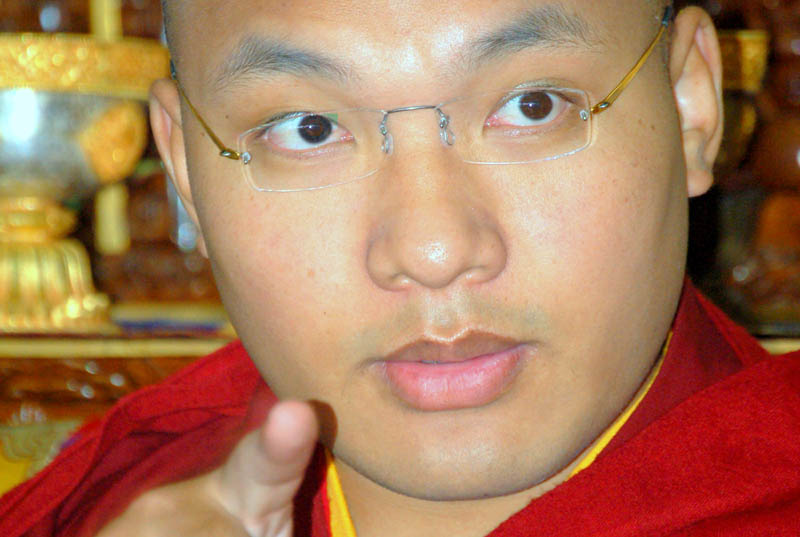 Dharamshala, India: - The Chinese-oppressed province of Eastern Tibet has enclosed itself in a ring of fire. The grisly act of self-immolation has become horrifically routine, with at least six Tibetan monks having died since March 2011.
Dharamshala, India: - The Chinese-oppressed province of Eastern Tibet has enclosed itself in a ring of fire. The grisly act of self-immolation has become horrifically routine, with at least six Tibetan monks having died since March 2011.
Yesterday, (9th November) In his first statement to the press since the last few self-immolations, the young and revered His Holiness the 17th Karmapa commented on the tragedy of these drastic acts, making an appeal to the Chinese to stop using such repressive measures against the people of the Sichuan province, while also urging Tibetans to stop resorting to self-immolation.
Commenting on the situation, he said, "These desperate acts, carried out by people with pure motivation, are a cry against the injustice and repression under which they live. The situation is unbearably difficult, but in difficult situations we need greater courage and determination".
He added that each of the deceased monks were incredibly young and regretted the opportunities they had missed in making contributions to the movement.
"In Buddhist teaching life is precious. To achieve anything worthwhile we need to preserve our lives. We Tibetans are few in number, so every Tibetan life is of value to the cause of Tibet. Although the situation is difficult, we need to live long and stay strong without losing sight of our long term goals".
In 2000, the 17th Karmapa, Ogyen Trinley Dorjee, fled Tibet and arrived in Dharamshala into the welcoming arms of His Holiness, the Dalai Lama and his people in exile. Since 2000, he has been in asylum in India, holding a refugee status. He is part of the Buddhist trinity, one of the most important Buddhist religious figures following the Dalai Lama and the Panchen Lama.
Reiterating His Holiness the Dalai Lama's beliefs, the Karmapa has said, "The Chinese leadership should face up to the real source of these tragic incidents.... A ruthless response will only make things worse. Where there is fear, there can be no trust".
He echoed the Dalai Lama's opinion that the use of force is counter-productive and repressive measures can never bring unity and stability.
In the recent past, the Chinese government has lashed out at Tibet's spiritual leader, accusing him of encouraging monks to self-immolate. His Holiness the Dalai Lama, in response, stated that it is the Chinese's "cultural genocide" in Tibet that was the primary reason behind these drastic acts.
The 17th Karmapa's statements are immensely significant to the current situation, considering that he is the only top Buddhist leader also recognised by the Chinese government.
In his statement to the press, he appeals to the Chinese government to review its policies towards Tibetans and other minorities, and heed to the legitimate demands of Tibetans through a constructive and meaningful dialogue, rather than resorting to brute force.
Over the past few months, the Tibetan struggle has gathered momentum, with thousands of supporters coming together worldwide to show their solidarity with the cause. World governments have remained safe in their stance towards Tibet, but Tibet support movements springing up all over the world, coupled with an escalating number of Tibetan deaths, has put pressure on global leaders to take more proactive action against China.
"I appeal to right-thinking,freedom-loving people throughout the world to join us in deploring the repression unleashed in the monasteries in Tibet, particularly in the
Tibetan region of Sichuan" said the 17th Karmapa.
"Because the Tibetan issue involves truth and justice, people are not afraid to give up their lives, but I request the people of Tibet to preserve their lives and find other, constructive ways to work for the cause of Tibet. It is my heartfelt prayer that the monks and nuns, indeed all the Tibetan people, may live long, free from fear, in peace and happiness".


![Tibet has a rich history as a sovereign nation until the 1950s when it was invaded by China. [Photo: File]](/images/stories/Pics-2024/March/Tibet-Nation-1940s.jpg#joomlaImage://local-images/stories/Pics-2024/March/Tibet-Nation-1940s.jpg?width=1489&height=878)















